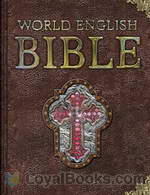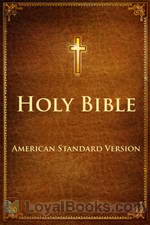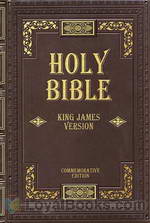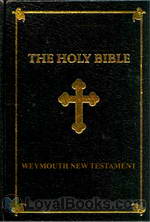|
Books Should Be Free Loyal Books Free Public Domain Audiobooks & eBook Downloads |
|
|
Books Should Be Free Loyal Books Free Public Domain Audiobooks & eBook Downloads |
|
Religion |
|---|
Book type:
Sort by:
View by:
|
By: Unknown | |
|---|---|
 World English Bible (WEB) - Matthew
World English Bible (WEB) - Matthew
The World English Bible (also known as WEB) is a public domain translation of the Bible that is currently in draft form. Work on the World English Bible began in 1997 and was known as the American Standard Version 1997. The New Testament is considered complete and is available in print.The World English Bible project was started to produce a modern English Bible version that is not copyrighted, does not use archaic English (such as the KJV), or is not translated in Basic English (such as the Bible In Basic English)... | |
 The Bible, American Standard Version (ASV) - Genesis
The Bible, American Standard Version (ASV) - Genesis
The Bible was first translated into English some time in the 7th century by an unnamed monk known to us as the Venerable Bede. This was the Old English version and the work of translation from Vulgate Latin into Middle English was taken up again in the 14th century by the famous religious dissenter John Wycliffe. Modern translations date from the 16th century onwards and these were sourced from Greek and Hebrew versions as well as Latin. Most translations are made by a large group of scholars and a committee is set up to review and modify the work as required... | |
 The Bible, King James Version (KJV) - Introduction
The Bible, King James Version (KJV) - Introduction
Variously known as the Greatest Story Ever Told, The Book of Books and many other names, the Bible is reputed to be the biggest bestseller of all time. Translated into thousands of world languages and studied, worshiped and revered in the four corners of the earth, the Bible remains Christianity's canonical text and is considered the Word of God. The King James Version (KJV) is a translation commissioned by the Church of England in 1604 and the work continued till 1611. However, it wasn't the first translation into English from the original Hebrew, and some portions in Aramaic... | |
 The Bible, Weymouth New Testament (WNT) - Matthew
The Bible, Weymouth New Testament (WNT) - Matthew
The Weymouth New Testament ("WNT"), otherwise known as The New Testament in Modern Speech or The Modern Speech New Testament, is a translation into "modern" English as used in the nineteenth century from the text of The Resultant Greek Testament by Richard Francis Weymouth from the Greek idioms used in it. It was later edited and partly revised by Reverend Ernest Hampden-Cook in London, England. Publishers: Baker and Taylor Company (New York) in 1903 and James Clarke & Co (London) in 1903.Richard Francis Weymouth's popular translation of the New Testament into English was first published in 1903 and has been in print through numerous editions ever since with millions of copies sold... | |
By: Amy Le Feuvre (1861-1929) | |
|---|---|
 His Big Opportunity
His Big Opportunity
Dudley and Rob were taught in Sunday School that they should use the opportunities God gives to help others. Ever since, they have been looking for 'their big opportunity' to do good for somebody. | |
 Odd
Odd
He found the word for her, and she read with difficulty, 'Trouble, distress, great affliction.' 'Do they all mean tribulation?' she asked. 'Tribulation means all of them,' was the answer. 'And can children have tribulation, Mr. Roper?' 'What do you think?' 'I must have it if I'm to get to heaven,' she said emphatically; and then she left him, and the young man repeated her words to himself with a sigh and a smile, as he replaced the book in its resting-place. Little Betty is lonely being the "odd" one ... | |
 Carved Cupboard (Dramatic Reading)
Carved Cupboard (Dramatic Reading)
Agatha, Gwen, Clare and Elfie have always been told that they will inherit their aunt's house. But when their aunt dies, she leaves it all to their intolerable cousin James. What will they do? Will the verses Nannie gives them prove true? | |
By: Anonymous | |
|---|---|
 Mother Stories From the New Testament
Mother Stories From the New Testament
A book of the best stories from the New Testament that mothers can tell their children. | |
 Wee Ones' Bible Stories
Wee Ones' Bible Stories
This is a short book of Bible Stories for Children. | |
 Little Folded Hands
Little Folded Hands
Christian prayers for children to be said at mealtime, bedtime, special occasions and more. | |
 Bible For Young People Vol. 1
Bible For Young People Vol. 1
"The Bible for Young People tells the sweet and simple stories of the Bible in the Bible language, omitting only genealogies and doctrines, and whatever is generally regarded as unprofitable to young readers. Moreover, it is so divided into subjects, forming complete stories, that the child will be interested in every part of it. ... Verse divisions have been disregarded, and a totally new system of chapters introduced in place of the familiar ones, and it is hoped that this novelty will give fresh interest to the old book... | |
 Bible For Young People Vol. 2
Bible For Young People Vol. 2
"The Bible for Young People tells the sweet and simple stories of the Bible in the Bible language, omitting only genealogies and doctrines, and whatever is generally regarded as unprofitable to young readers. Moreover, it is so divided into subjects, forming complete stories, that the child will be interested in every part of it. ... "Verse divisions have been disregarded, and a totally new system of chapters introduced in place of the familiar ones, and it is hoped that this novelty will give fresh interest to the old book... | |
By: Basil Joseph Mathews (1879-1951) | |
|---|---|
 Book of Missionary Heroes
Book of Missionary Heroes
Through the centuries, the world has been witness to an unbroken trail of heroes--men and women who braved privation, danger, and death to bring the light of Jesus Christ to the darkest corners of the earth. Some are well known, others long forgotten, but all belong to the same indomitable band of torch-bearers. Join a few of these heroes as they face cannibals, battle slave traders, and care for sick enemies, always with one mission at the forefront--to serve their Lord and bring others into His light. | |
By: Blessed Angela of Foligno (1248-1309) | |
|---|---|
 Book of Divine Consolation of the Blessed Angela of Foligno
Book of Divine Consolation of the Blessed Angela of Foligno
The Blessed Angela of Foligno, T.O.S.F., (c. 1248 – 4 January 1309) was a Christian author, Franciscan tertiary and mystic. She was noted not only for her spiritual writings, but also for founding a religious community which refused to accept becoming an enclosed religious order that it might continue her vision of caring for those in need. The Divine Consolation is divided into three treatises. In the first, Blessed Angela talks about her conversion. The second is her teachings. And in the third treatise, she shares her visions of Consolation, the Passion of Christ, the Sacrament of the Altar, and of the Blessed Virgin Mary. | |
By: Darby Bible | |
|---|---|
 Bible (Darby) NT 06: Romans
Bible (Darby) NT 06: Romans
The Darby Bible consists of a translation of the New Testament by John Nelson Darby, originally published in 1867, and a translation of the Old Testament, included in later editions of the text, completed by Darby's students after his death. | |
 Bible (DBY) NT 01: Matthew
Bible (DBY) NT 01: Matthew
The Darby Bible consists of a translation of the New Testament by John Nelson Darby, originally published in 1867, and a translation of the Old Testament, included in later editions of the text, completed by Darby's students after his death. | |
 Bible (DBY) NT 02: Mark
Bible (DBY) NT 02: Mark
The Darby Bible consists of a translation of the New Testament by John Nelson Darby, originally published in 1867, and a translation of the Old Testament, included in later editions of the text, completed by Darby's students after his death. | |
 Bible (DBY) NT 03: Luke
Bible (DBY) NT 03: Luke
The Darby Bible consists of a translation of the New Testament by John Nelson Darby, originally published in 1867, and a translation of the Old Testament, included in later editions of the text, completed by Darby's students after his death. | |
 Bible (DBY) NT 04: John
Bible (DBY) NT 04: John
The Darby Bible consists of a translation of the New Testament by John Nelson Darby, originally published in 1867, and a translation of the Old Testament, included in later editions of the text, completed by Darby's students after his death. | |
 Bible (DBY) NT 05: Acts
Bible (DBY) NT 05: Acts
The Darby Bible consists of a translation of the New Testament by John Nelson Darby, originally published in 1867, and a translation of the Old Testament, included in later editions of the text, completed by Darby's students after his death. | |
 Bible (Darby) NT 07: 1 Corinthians
Bible (Darby) NT 07: 1 Corinthians
The Darby Bible consists of a translation of the New Testament by John Nelson Darby, originally published in 1867, and a translation of the Old Testament, included in later editions of the text, completed by Darby's students after his death. | |
By: Ferrar Fenton Bible | |
|---|---|
 Bible (Fenton) NT 03, 05: Holy Bible in Modern English, The: Luke, Acts
Bible (Fenton) NT 03, 05: Holy Bible in Modern English, The: Luke, Acts
Work on the translation began in 1853 by a London businessman called Ferrar Fenton (1832–1920). The complete Bible was first published in 1903, though parts were published as separate volumes during the preceding 11 years. The translation is noted for a rearranging of the books of the Bible into what the author believed was the correct chronological order. In the Old Testament, this order follows that of the Hebrew Bible. The name of God was translated throughout the Old Testament as "The Ever-Living"... | |
 Bible (Fenton) 08, 13-14, 16-22, 25, 27: Holy Bible in Modern English, The: Psalms to 2 Chronicles
Bible (Fenton) 08, 13-14, 16-22, 25, 27: Holy Bible in Modern English, The: Psalms to 2 Chronicles
The Holy Bible in Modern English, commonly known as the Ferrar Fenton Bible, was one of the earliest translations of the Bible into "modern English" (i.e., English as spoken and written in the 19th and 20th centuries). Work on the translation was begun in 1853 by a London businessman named Ferrar Fenton (1832–1920). The complete Bible was first published in 1903, though parts were published as separate volumes during the preceding 11 years. Fenton spent approximately fifty years working on his translation, with his sole goal 'to study the Bible absolutely in its original languages, to ascertain what its writers actually said and thought'... | |
 Bible (Fenton) 11,12,23,24,26: Holy Bible in Modern English, The: 1 Kings-Ezekiel
Bible (Fenton) 11,12,23,24,26: Holy Bible in Modern English, The: 1 Kings-Ezekiel
Work on the translation began in 1853 by a London businessman called Ferrar Fenton (1832–1920). The complete Bible was first published in 1903, though parts were published as separate volumes during the preceding 11 years. The translation is noted for a rearranging of the books of the Bible into what the author believed was the correct chronological order. In the Old Testament, this order follows that of the Hebrew Bible. The name of God was translated throughout the Old Testament as "The Ever-Living"... | |
 Bible (Fenton) 28-39: Holy Bible in Modern English: Hosea - Malaki
Bible (Fenton) 28-39: Holy Bible in Modern English: Hosea - Malaki
Work on the translation began in 1853 by a London businessman called Ferrar Fenton (1832–1920). The complete Bible was first published in 1903, though parts were published as separate volumes during the preceding 11 years. The translation is noted for a rearranging of the books of the Bible into what the author believed was the correct chronological order. In the Old Testament, this order follows that of the Hebrew Bible. The name of God was translated throughout the Old Testament as "The Ever-Living"... | |
By: George Hodges (1856-1919) | |
|---|---|
 Saints and Heroes Since the Middle Ages Volume 2
Saints and Heroes Since the Middle Ages Volume 2
In this second volume, Hodges uses stories of the lives of fourteen well-known saints and heroes of the faith to continue the history of the church from the end of the Reformation through the 1700s. These stories recount their lives and sacrifices for the faith. These saints and heroes include: Luther, More, Loyola, Cranmer, Calvin, Knox, Coligny, William the Silent, Brewster, Laud, Cromwell, Bunyan, Fox, and Wesley. Appropriate and beneficial for children and adults! - Summary by Maggie Travers | |
 Saints and Heroes to the End of the Middle Ages
Saints and Heroes to the End of the Middle Ages
Though these stories of the lives of twenty saints and heroes of the faith, we have an introduction to the history of the church from 3rd century A.D. to the Reformation. These stories chronicle their lives and sacrifices for the faith. These saints and heroes include: Cyprian, Athanasius, Ambrose, Chrysostom, Jerome, Augustine, Benedict, Gregory the Great, Columba, Charlemagne, Hildebrand, Anselm, Bernard, Becket, Langton, Dominic, Francis, Wycliffe, Hus, and Savonarola. Appropriate for children and adults. | |
By: Gerald Birney Smith (1868-1929) | |
|---|---|
 Guide to the Study of the Christian Religion
Guide to the Study of the Christian Religion
Articles by numerous authors, compiled into a single collection for use by first year divinity students. This book is intended to be a guide to the study of the Christian religion for Protestants. It was prepared to aid students to understand various aspects of education for the Christian ministry, including basic textual studies, theology, Christian history, denominations, Christian ethics and pastoral duties. | |
By: Gregory of Nyssa (c 335 - c 395) | |
|---|---|
 Funeral Oration on Meletius
Funeral Oration on Meletius
Saint Meletius was Patriarch of Antioch from 360 until his death in 381. One of his last acts was to preside over the First Council of Constantinople, held in 381. Saint Gregory of Nyssa, renown as one of the Cappadocian Fathers, was in attendance, and gave the eulogy at the latter's funeral. However, the text repeatedly alludes to an event of joy in contrast to the repose of Meletius. This refers to the very recent installation of Gregory Nazianzen as Archbishop of Constantinople. | |
By: Henry A. Sherman (1870-?) | |
|---|---|
 Children's Bible
Children's Bible
This is a Book of Children's Bible Stories. | |
By: James Frazer (1854-1941) | |
|---|---|
 Golden Bough: The Magic Art and the Evolution of Kings, Volume 2
Golden Bough: The Magic Art and the Evolution of Kings, Volume 2
The second volume in Frazer's seminal 12 volume set on anthropology and traditional systems of belief. The superstition and magical purpose of kings is further discussed alongside the worship of trees, vegetation, fire, and the sacred marriages, and the mystical bond between people and trees. - Summary by Leon Harvey | |
 Golden Bough: The Magic Art and the Evolution of Kings, Volume 1
Golden Bough: The Magic Art and the Evolution of Kings, Volume 1
The first volume in Frazer's seminal 12 volume set on anthropology and traditional systems of belief. Topics covered include extensive discussion on the belief in sympathetic and contagious magic, magical influence on the environment, magicians and kings, magicians as priests, the origin of incarnate living gods, and a lengthy essay on the origin on the king of the wood at the lake of Nemi. | |